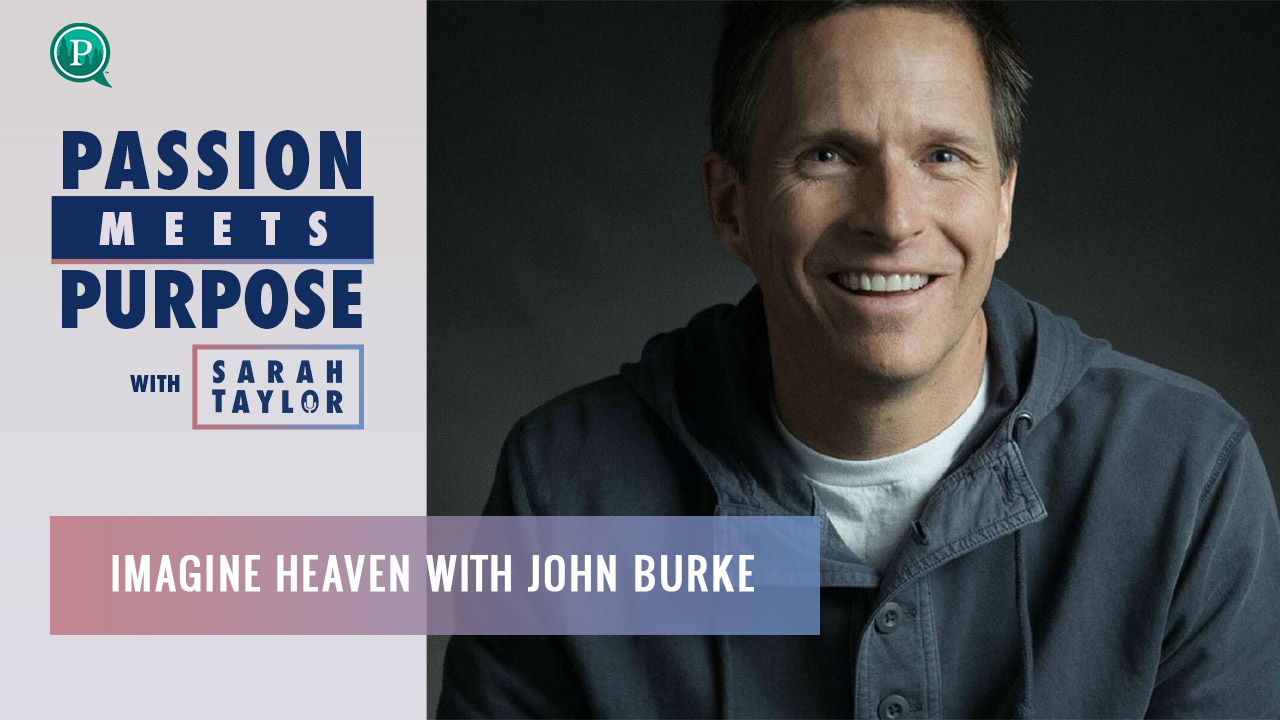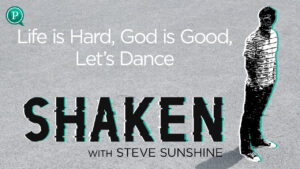So many Christians picture retirement and can save for it and sacrifice for it and work for it. But if you can’t picture heaven, you’re not gonna save for it and sacrifice for it and work for it. And so that is why it’s so important that we do imagine heaven. His book is Imagine Heaven and this conversation with John Burke dives into what heaven is like and why we can find so much comfort in what’s to come.
Interview Links:
Find John Online | Instagram | Facebook | Twitter
Book: Imagine Heaven: Near-Death Experiences, God’s Promises, and the Exhilarating Future That Awaits You
Transcription:
Purposely: your life, God’s purpose. Listen at onpurposely.com.
John Burke: So many Christians I think don’t really, they picture they have a great picture of retirement and you know, if we can picture it, we’ll save for it and sacrifice for it and work for it. But if you can’t picture heaven, you’re not gonna save for it and sacrifice for it and work for it. And so that I think is why it’s so important that we do imagine heaven.
Sarah Taylor: His name is John Burke. His book is Imagine Heaven. I’ve probably read it through three different times. It’s one of those books that you keep close because I have found so much comfort in the stories described in this book. We’re gonna dive into a couple of them in this conversation that I was so excited to have, because it truly fascinates me.
You know, what comes next, what heaven is like. And one of the things John discusses is that he thinks a lot of people actually have the concept wrong, . So, you know, there’s a way to begin. John, why don’t you share your background with us a little bit and then let’s dive into this book.
John Burke: Well, I’m John Burke. I’m a pastor here in Austin, Texas. And I wrote, Imagine Heaven after studying about a thousand near death experiences where where people have clinically died, their heart stopped, their brainwaves have stopped, and yet they were resuscitated and they claim that they got a peak into the life to come into the afterlife.
And in Imagine Heaven, I’m taking 120 of those stories and showing how they reconcile with scripture, how they really color in the picture that scripture’s been giving us all along. And it really, you know, really to help us get this exhilarating picture of what God has promised what’s to come.
Sarah Taylor: JP Morland, who’s a distinguished professor of philosophy at Biola University, he says that he loves that your book helps answer the questions to just a typical person has on this subject.
And I agree with him. Why don’t you go ahead and say a couple of the most normal questions we have about heaven and then how you went about talking about those in your book.
John Burke: Yeah, I mean people, one of the things I find is that we, we don’t necessarily think heaven is going to be more real, more tangible, more life than right now.
I don’t know why we default there, but we do. And so people wanna know, will I be myself? Will, Will, will I have relationships still with the people here on Earth? Will we remember things about each other? You know, what will we do forever? You know, we tend to think that anything forever would get boring, right?
What will heaven look like? People wanna know what about my pets? You know, will they be there too? And I address all these questions and more in Imagine Heaven, but by looking at not only what the scriptures say, but what people say they’ve experienced and, and the commonalities as well. And so, by the end of it, not only do you have a sense of answer to those questions, but I think you get a bigger picture of the, the life that Jesus promised us and how great it’s really gonna be.
Sarah Taylor: Let’s dive into some of the common experiences you talk about because you interviewed doctors, college, professors, bank presidents, people of all ages and cultures, and fascinatingly, even some people who were blind. And they solve things.
John Burke: Yeah. Well, those are, those are the best.
Sarah Taylor: Yeah. Let’s talk a little bit about the common experiences.
John Burke: Yeah, so I go, I go into there, you know, the 12 different, the 12 common experiences that, that people have across the globe, like, like, people feel more alive than they’ve ever been. So when people have these, when they clinically die they leave their bodies, but they tend to be still somewhere in the room initially watching the resuscitation on their own body.
But they still have a body. It’s a spiritual body. It’s like what Paul talked about that, you know, this natural body is sown in dishonor, but it’s raised in honor and they talk about how they felt more alive than they’ve ever felt before. Not, not just with like five senses, but more like with 50 senses.
And, and so people don’t even realize that they’re dead. Because they, they’ve never felt so good. Another commonality is people commonly see beauty not unlike the earth, you know, mountains and trees and forests and valleys and flowers and streams. But they talk about how all of it’s experienced really in new dimensions of time and space. You know, so for instance, the color spectrum, that’s a commonality.
People talk about the brilliant vivid colors, like just a, a, a sensory explosion, just colors that they’ve never seen before, which actually I show how that makes sense because, you know, the colors we experience on earth are, are the spectrum of the, the rays of the sun. But if John’s correct in the book of Revelation, you know, the light of heaven is the glory of God.
And so it’s a spectrum of light way beyond what we’ve ever experienced. And when you hear people talk about that it’s un it’s unbelievable. You, you mentioned blind people. Do I have a a second to tell the story of Brad?
Sarah Taylor: You have, you can tell as many stories as you want.
John Burke: Okay. So one of the guys that I write about in Imagine Heaven is Brad and several other blind people who Brad, when he was eight years old he lived in a home for, for blind kids.
And he basically stopped breathing and left his body and he watched he could see. For the first time and he watched his blind roommate stumble out into the hall to get help cuz he could tell something was wrong. And then he talked about. How for the first time he could see colors. And then he went through this tunnel that he said, I began to wonder if this was darkness because there was no color whatsoever.
And then he comes out and he finds himself in this immense field, what he seemed like, stretched for miles. He noticed huge palm trees, enormous leaves, tall grass. And here’s what he. I was walking up this field, it seemed as, as if I were so exhilarated, so unbelievably renewed. I didn’t want to leave. I wanted to stay forever where I was.
There’s no way to describe the peace and tranquility. The weather was absolutely perfect in terms of temperature and humidity. It was so fresh, so unbelievably fresh, that mountain narrow on Earth couldn’t even come close. And it’s interesting because a blind person would notice the temperature and humidity, wouldn’t they?
Sarah Taylor: Yeah.
John Burke: And then he says this about the light. There was tremendous light there. It seemed to come from every direction. It was all around and everywhere that I happened to be looking, it seemed like everything, even the grass I’d been stepping on seemed to soak in that light. It seemed like the light could actually penetrate through everything, even the trees on the leaves, on the trees, and there was no shade.
There was no need for shade. The light was actually all encompassing, yet I wondered how could I know that? Because I’d never seen before that point. I felt like I wouldn’t understand it had it happened on Earth, but where I was, I was able to accept it almost immediately. And when you start to hear blind people and little children and spine surgeons and TWA airline pilots and former college professors describing this light of heaven that comes out of everything.
And, and you go, How would a blind person get that idea just listening to people here on earth? Light doesn’t come out of everything. It shines on everything, right?
Sarah Taylor: Mm-hmm.
John Burke: And, and yet in Revelation we’re told that there is no sun or moon for the Lord is its light. Isaiah says the same thing, and, and the nations will walk in that light of the glory of the Lord.
And that’s exactly what people are experiencing. And so I show how all these stories align with the scriptures and, and they align with each other to give us this panoramic view so that, you know, by the end of Imagine Heaven, you kind of feel like, wow, I feel like I’ve, I’ve kind of been there, you know, , I’m sure there’s much more, but you start to really get a taste for this is a real place and it’s gonna be so great.
Sarah Taylor: I have to ask, have you encountered some opposition or some resistance to this work?
John Burke: Oh yeah.
Sarah Taylor: Tell me a little, tell me a little bit about that.
John Burke: Well, I think it’s the same skepticism I had for years. I, you know, I for 30 years I’ve been studying these and studying the scriptures and, you know, I’ve gone to seminary, I’ve started churches.
And so. I don’t believe people should form their view of heaven in the afterlife based on individual stories. I think we should start with the scriptures. And so what I started to realize after studying a thousand of them is that what people report is one thing. How they interpret what they report is another.
And that’s very important to, to distinguish and I think where there’s a lot of skepticism or criticism, especially among Christians, is when they hear individual stories and they, they hear one person’s interpretation, but they haven’t studied a thousand of them to see what they’re reporting and how it reconciles with what others say and what the scripture says and how it maybe their interpretation is off, but you can make sense of what they’re reporting, and that’s really what I’m trying to do in Imagine Heaven.
Sarah Taylor: How has compiling this book and all these stories that you’ve filtered through, how has it deepened your faith?
John Burke: Well, I think it’s, you know, it, it definitely has, it’s deepened my faith over the years and not that, it’s not that you get any new knowledge really from these stories that aren’t already in the scriptures.
It’s just that people, you know, what the scripture say says about heaven is all over from genesis to revelation, and people don’t often put it all together and they don’t imagine it.
Sarah Taylor: Hmm.
John Burke: And so what it’s done for me that I, believe and hope it’ll do for others who read Imagine Heaven is it’s helped me to see that what Jesus said is true.
That, you know, this is not the life to live for. Don’t store up your treasures here on Earth. They’re going away, but there are treasures that are gonna last. You know, He said if God is giving you property right now to steward that’s not your own, who’s gonna give you property that that is your own, that will really last? When we’re there, we’re going to rule, you know, some people are gonna rule cities, some angels, some nations, we’re gonna have jobs, we’re gonna have work to do.
And, and so he says there, there, are gonna be rewards. And I write about what are those rewards? What might they be? So understanding. I think that’s why Colossians 3:1 says, Set your mind on things above, not on things of the earth for your life is hidden in Christ. And that’s how it’s changed me.
You know, one of the things I’ve realized over the years is the reason I was willing to you know, lead my engineering career for ministry is I wanted to make the most of my time to lead as many people as I can to heaven. I wanted to make the most of my time to use my life you know, in, in any way I can to further God’s kingdom.
You don’t have to be in full-time ministry to do that. You can do that anywhere where you live. But so many Christians I think don’t really, they picture they have a great picture of retirement and you know, if we can picture it, we’ll save for it and sacrifice for it and work for it. But if you can’t picture heaven, You’re not gonna save for it and sacrifice for it and work for it.
And so that, I think, is why it’s so important that we do imagine Heaven.
Sarah Taylor: The passion Meets Purpose podcast is made possible thanks to our friends at Northwest University ensuring a welcoming spirit for you at Northwest University. Your tuition remains lower than all other Christian schools in Washington.
And NU is all in on Tech. They’ve got a brand new state-of-the-art technology studio and majors include UX design, data science, video production, audio production, and computer science.
This is in addition to an already diverse offering of business, nursing education, sciences, communication, psychology, music and humanities. Northwest university is a faith-based community, Christ centered in all they do. At Northwest University, your future isn’t canceled, it’s just beginning.
Let’s talk about a couple more of the specific stories. One of the ones I loved, I laughed out loud because it was so precious to me, and then I read it out loud to my husband at home. It comes early on in the book, and it’s a gentleman who he didn’t necessarily believe in God or I don’t have the book in front of me, so you’re gonna have to help my paraphrase here.
Didn’t, didn’t necessarily believe in God had kind of a startling, scary first encounter, like at the, at the beginning of his near death experience. And then he felt like something inside of him said to pray to God and he didn’t know how to pray to God. But then when he fumbled out his prayer, which included things like Purple Mountains, Majesty, you know, just any childhood recollection of anything he had deep inside of him, I loved, I loved that that was enough.
John Burke: Oh, well you’re, you’re talking about the chapter I write on hellish near death experiences.
Sarah Taylor: Right.
John Burke: Yeah, and I interviewed, he was a college professor, who was an atheist and you know, a tenured college professor. And he was actually in Paris when his lower intestine ruptured. And you know, they say you got about five hours usually before you pass.
And it was a weekend. He went to the hospital. There were, there were no surgeons to be found. Nine hours later they still hadn’t found one. And he passed away. And, and yeah, initially he felt great. You know, he felt more alive than ever before. He couldn’t figure out why he couldn’t get his wife’s attention, but he, he didn’t know he was dead.
Cause he, he just knew that when you die it just lights out. Game over. But he felt more alive than ever before. And yet this, he has this group of people out in the hallway calling to them, to him, and he, they seem nice and and they said, Howard, come with us. We’re gonna help you. So he starts going with them.
Is this a story you’re talking about?
Sarah Taylor: Yeah, it is.
John Burke: Yeah, and, and you know, again, you have to understand that time, you know, it’s like Peter said to the Lord, today is like a thousand years and a thousand years is like a day. And that’s one of the commonalities. They talk about how they didn’t know if it was an instant or years.
And so he starts following them. And, and he, he starts to realize they’re, they’re going dark into a darker and darker place until he finds himself in this, what he described as outer, this outer darkness. And he starts to be terrified that they’re deceiving him and he tries to go back and and they start to just literally devour him.
And that’s where you talk about when you know he’s, he’s laying there and this voice inside his chest said, Pray to God. And he thought to himself, I don’t believe in God. That’s ridiculous. And again, pray to God. And I mean, he’s in, he’s in horrible shape, you know? And, and he, he still doesn’t even know where he is.
And third time, pray to God. And he, and he thought, I don’t even know how to pray. I don’t know what to pray. But he, like you said, he pieced together just like. You know God bless America.
Sarah Taylor: Yeah.
John Burke: And Star Spangled Banner.
Sarah Taylor: Yep.
John Burke: You know, just things like that. But anytime he would say the word God, these, these hideous people who were just devouring him and doing horrific things.
I interviewed him personally and he couldn’t. He couldn’t even talk about it. He said, I’ve, I’ve spent most of my life trying to push that outta my memory.
Sarah Taylor: Mm.
John Burke: But he, he said that they start, they felt, it felt to him like it was, like he was pouring boiling oil on them anytime he said anything about God.
Sarah Taylor: Mm.
John Burke: Until they backed off. And then he lay there in the dark for what he said felt like an eternity, realizing that he had wasted his life. He had spent his life on himself. He, he had been trying to build an edifice to himself, and he was, he realized he was becoming just like these creatures who were devouring him.
And in that moment, he remembered when his, his parents dropped him off at Sunday school a few times when he was a kid. And this song came into his mind, Jesus loves me, blah, blah, blah. He couldn’t remember anything else.
Sarah Taylor: Hmm.
John Burke: And from the depth of his soul, he wanted that to be true. That somebody loved him and he felt it so intensely with all his, all he had left, he cried out, Jesus, save me.
And then he sees this tiny light in the dark coming toward him until it gets brighter and brighter, brighter than the sun. And this is one of the commonalities of those who experience, who, who see the Lord is he’s this brilliant man of light, brighter than the sun. And the light is love, and the light is life.
And this brilliant light that just shines like diamonds. Two arms, reach out and pick him up and take him out of that dark pit. And and you know, the, the story goes on of how he ends up having a life review, which is another commonality. But the amazing thing to me is that, you know, Howard was a tenured atheist professor.
He comes back from this near death experience and he is so changed that he ends up becoming a Christian pastor. His wife, who is an atheist, left him, but he sold all to, to tell people about Jesus. You know, it’s just, it is phenomenal. Like you said, you know, it shows just like the thief on the cross that it doesn’t take anything but a heart turning to the Lord.
Sarah Taylor: Yeah, I just, I’m, I’m so grateful to see that, although there’s another part of that where I’m just kinda like, Well, man, the first half of that was really scary. How did you handle the, the scary near death experiences and some of what you heard and reconcile that with your faith in a loving God?
John Burke: Well, yeah, I mean, one of the things. You know, I write about is, I think a, a right picture of heaven makes sense of why we suffer so. You know, and why we go through so much. Because what you start to see through Imagine Heaven is that we, we are not temporal creatures who are, you know, either gonna be rewarded or punished eternally for our temporal you know, acts we do here.
.I think in fact we are eternal creatures and God has given us temporal chance after chance, after chance to just turn our hearts back to him and be made right with him.
Mm.
And I think, you know, Howard and several others show that you know, now one thing that’s important to note, I don’t think, I don’t think you can choose God and choose salvation and be saved, after death.
Which may seem confusing cuz didn’t Howard die? Well all of ’em and I, and I show, this is one of the other commonalities I show in Imagine Heaven. All of them talk about, or many of them talk about how there was a border or a boundary, they knew they couldn’t cross or they couldn’t come back to life because they all came back to life.
So whatever these peaks into the afterlife are, they’re not the final destination and, and I think that’s important to note. I think that’s why Howard could still make a choice because, you know, he came back to life. But I do try to reconcile the different experience, the different hellish experiences with what the scriptures say as well.
And the, the scary thing you see is that. Yeah, that’s real too. And you start to see that this life is actually, you know, like I said, people feel more alive, not just with five senses, but with 50 senses.
Sarah Taylor: Mm-hmm.
John Burke: You know, their, their joy and their pleasure and the praise and glory of God. I mean, what you experience is exponentially greater than the greatest things we can even imagine here on this earth.
But equally true is the sufferings and the pain and the horrific things that we do to each other by going our way rather than God’s way. That’s just a small, small taste of what, you know, creatures eternally can do to one another when they choose to walk away from God and live apart from his love and, and, and his light.
Sarah Taylor: As we wrap up, talk a little bit about the welcoming committee.
John Burke: Oh yeah. So, you know, one of the things people ask is, will I see, you know, my, my friends, my relatives, my loved ones? And that is one of the main things that people talk about. Don Piper, who was a pastor, you know, who was run over by an 18 wheeler in 90 minutes, he was pronounced dead by EMS. And yet he says he, he was there at the gates, you know. And, and that’s the other thing I show is the, the vision John has of this immense, amazing city that people experience, Christians experience that.
And Don was there in front of this, this wall in the city and, and the gates of, of heaven, which by the way are not anything like what we picture. It’s mesmerizing. But there’s this welcoming committee of people, and this is common of all the people that have gone before us, and they are just full of joy and they’re there to welcome us.
And, they’re, they’re there to kind of usher us in. And it is the greatest reunion ever imaginable. People, they’re, they, they’re able to communicate not just with words, but thought to, thought in, in the purest way. And and you know what, what Dale Black, a TWA airline captain said, he said, You know, when you’re, when you’re there with them, you just realize how much the fall and how much sin taints everything in this life.
And when there is no more sin or disease or, or death or, or separation caused by that and you’re with the ones you love, said, it’s just, it’s just a kind of joy that you’ve only dreamt of here on this earth.
Sarah Taylor: I imagine this book is gonna bring comfort to so many as it did to me. We all have someone that we love that is in heaven, and we wonder, you know, what their experiences are.
And so just to paint that picture, who is it that, that you have in heaven that comes to mind right now? The one that you are most looking forward to being on your welcoming committee?
John Burke: Well, you know, it’s interesting because when I wrote the last chapter of, of this book, my mom went into the hospital after eight years of of Alzheimer’s. You know, a long, slow, painful death. And those last 12 days in the hospital, I read the manuscript out loud to my mom and my sister while we while we basically waited for her to die. And I don’t know if she heard it, I think she probably did, but at the end of it, my sister said, I want to go with her.
That was feeling she had. No, you can’t. We’ve all got a purpose here, but I just think, you know, I can’t wait you know, to see my mom. And I know I can picture how happy and how joyous she was to be reunited with my dad. And and so the thought of. All of us, you know, my son and my daughter and my wife and all of us together again.
And it’s gonna be like Jesus said, I came to give them life abundantly. And that’s what I can really picture now of what that’s gonna be like.
Sarah Taylor: Thank you so much for your time, John. I really appreciate it.
John Burke: Well, I appreciate you having me on the, on the show.
Sarah Taylor: Yeah.
John Burke: Thanks for reading the book,
Sarah Taylor: Not only read it, but purchased several copies to give to friends and family. It starts a great discussion and really thankful that you put the time and the research into this. So also thankful to the team here that produces the podcast. So our content coordinator, Rebecca Beckett and Luke Swanberg. Our thanks to Debbie Sage, who runs our digital as well as Scott Karow, our fabulous producer with Terra Ferma.
I would love to know what you think about that episode and if you wanna hear more like this .And you can always get a hold of us at Purposely Podcasts and we will link you up with everything you need in the show notes. I’m Sarah Taylor. I’ll see you in two weeks.








